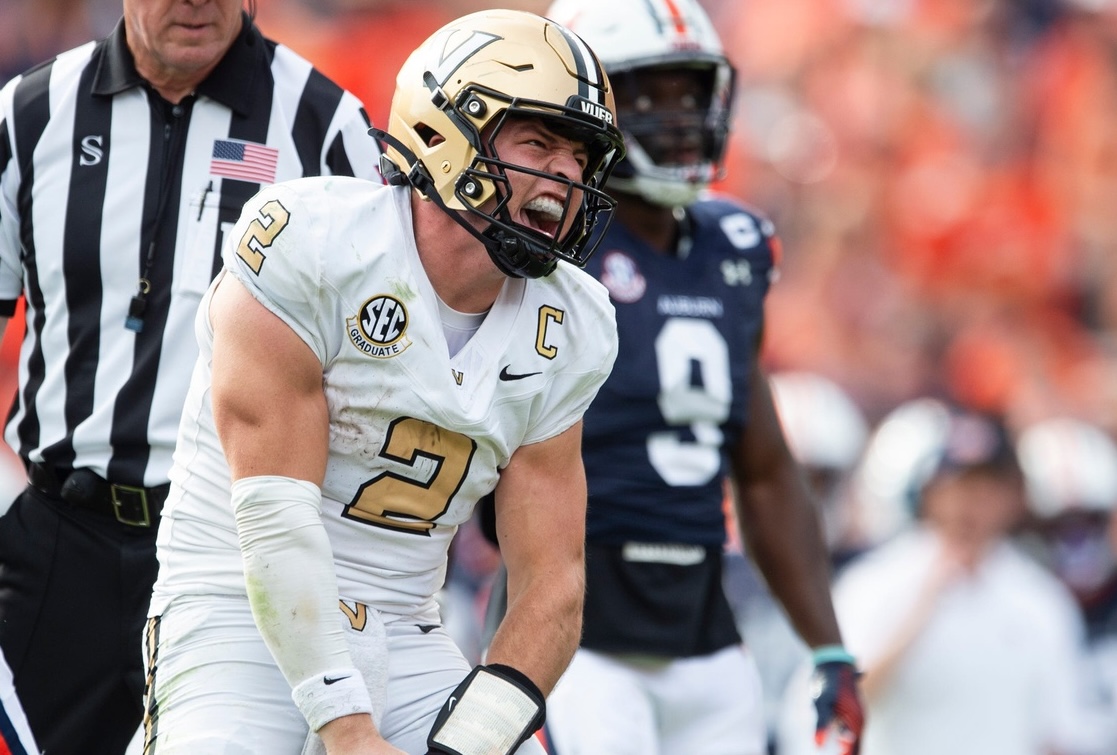On Wednesday, a federal judge granted an injunction giving Vanderbilt’s Diego Pavia the extra year of eligibility he had sought. The quarterback will almost certainly be able to play college football in 2025, and the ruling could have major implications for all of college sports.
The ruling, issued in a 25-page decision by federal judge William Campbell on Wednesday night, is still just preliminary. But Campbell wrote Pavia’s claims that the NCAA’s eligibility rules violate antitrust law have a “strong likelihood of success” at a full trial.
The injunction also prohibits the NCAA from punishing Pavia, Vanderbilt, or any other school he plays for next year if the ruling is ultimately overturned at trial. It appears Pavia plans to play for the Commodores again, as he dropped his catchphrase “VANDY WE TURNT” on social media Wednesday night, with an expletive and emoji thrown in for good measure. (His lawyer told the Associated Press he’d return to Vanderbilt “so long as he receives an appropriate NIL package.”)
NCAA athletes are allowed to play four seasons in five years, and time spent playing sports at junior colleges—which are not NCAA institutions—counts against those four seasons. Pavia played two years at New Mexico Military Institute in 2020 and 2021, and he filed the lawsuit after spending two remarkable years in the NCAA at New Mexico State and Vanderbilt.
He argued the NCAA’s rules counting years playing in junior college against Division I eligibility violated antitrust law because they prohibited him from maximizing NIL (name, image, and likeness) earnings. In his suit, filed in U.S. District Court for the Middle District of Tennessee, he speculated he would earn up to $1 million if the NCAA didn’t block him from playing next year at Vanderbilt.
Campbell agreed the restrictions blocking Pavia from playing another year in the NCAA were likely illegal.
“This does not mean that the NCAA cannot impose eligibility rules, only that those rules will be subject to further scrutiny to determine whether they are an undue restraint on trade,” he wrote.
Pavia’s lawyers celebrated the win in a statement and said it could permanently change how the NCAA treats junior college athletes.
“The NCAA has not yet adjusted to the NIL era and continues to impose unfair restrictions on college athletes,” Pavia’s attorney, Ryan Downton, said in a statement. “The Court’s ruling is another step in leveling the playing field to allow college athletes to share in the billions of dollars earned due to their labor. While the ruling is limited to Pavia, we believe it may open the door for other former junior college players to obtain an additional year of eligibility without filing a lawsuit.”
As Downton said, the injunction covers just Pavia, and stands only until the case is resolved. But other athletes may now file similar lawsuits and enjoy the precedent Pavia has set. Campbell’s ruling pointed out that, for example, the NCAA treated junior colleges and postgraduate prep schools—where some players spend a year between high school and college—differently. The NCAA eligibility clock does not start for those athletes, nor athletes who go on, for example, religious missions.
“Given the different treatment of other student-athletes with comparable or more post-secondary experience, the NCAA’s assertion that the eligibility rules are necessary to prevent age and experience disparities and preserve the quality of experience for student-athletes falls flat,” the judge wrote.
Downton said he did not seek to have all NCAA eligibility limits struck down. “But a junior college season shouldn’t be the equivalent of an NCAA season when the junior college season has no meaningful opportunities to earn NIL, no television exposure,” he told ESPN.
It’s yet another case of a judge finding that NCAA rules violate or likely violate antitrust law.
It’s the third temporary ruling of its kind striking down one of the NCAA’s restrictions in the past year alone, none of which have since been reversed. Due to two lawsuits brought by state attorneys general over the past year, the governing body lost the ability to restrict transfers and—also temporarily through a preliminary injunction—the ability to enforce NIL restrictions. The rulings have created a market of unrestricted free agency.
The NCAA called the ruling “disappointing” in a statement. “Altering the enforcement of rules overwhelmingly supported by NCAA member schools makes a shifting environment even more unsettled,” the governing body wrote, adding its usual comment that it has asked Congress to step in and pass legislation that would override all these court decisions. It did not immediately say whether other former junior college athletes would have additional eligibility. The football transfer portal is open until Dec. 28, a deadline Pavia sought to have his case addressed by.





![[Subscription Customers Only] Jun 15, 2025; Seattle, Washington, USA; Botafogo owner John Textor inside the stadium before the match during a group stage match of the 2025 FIFA Club World Cup at Lumen Field.](https://frontofficesports.com/wp-content/uploads/2026/02/USATSI_26465842_168416386_lowres-scaled.jpg?quality=100&w=1024)
![[Subscription Customers Only] Jul 13, 2025; East Rutherford, New Jersey, USA; Chelsea FC midfielder Cole Palmer (10) celebrates winning the final of the 2025 FIFA Club World Cup at MetLife Stadium](https://frontofficesports.com/wp-content/uploads/2026/02/USATSI_26636703-scaled-e1770932227605.jpg?quality=100&w=1024)










